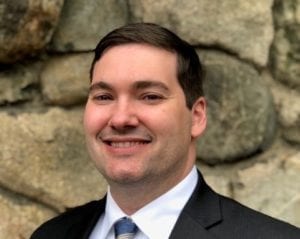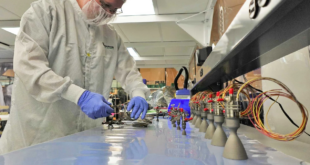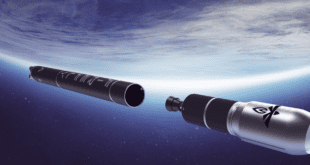
Benchmark Space Systems, a leading provider of green in-space propulsion systems for small satellites, announced an exclusive services agreement with rideshare leader Spaceflight Inc. to provide a full range of non-toxic chemical propulsion solutions designed to accelerate satellite rideshare deployments to prime orbital locations aboard its next-generation Sherpa orbital transfer vehicles (OTVs). Spaceflight’s first OTV in the Sherpa-NG family, Sherpa FX, will carry 16 customer spacecraft and several hosted payloads aboard a Falcon 9 no earlier than December 2020. Benchmark’s safe chemical propulsion will be equipped on an upgraded vehicle called Sherpa-LT as early as late next year. Benchmark’s propulsion features a patented On-Demand Pressurization System (ODPS) that securely fires up the thruster once the OTV is safely in space and deployed from the launch vehicle.
The exclusive propulsion agreement enables Spaceflight’s small-satellite missions to take full advantage of low-cost rideshare launches to sub-optimal locations in space, where its Sherpa-LT vehicle propelled by a Benchmark green thruster can maneuver rideshare and dedicated spacecraft to ideal orbits in a matter of hours.
Benchmark’s scalable, launch-vehicle agnostic propulsion product and services set supports a broad spectrum of spacecraft, from 1U CubeSats through ESPA-class (1-500kg) satellites, large lunar landers, and orbital transfer vehicles (OTVs), offering alternate rideshare options than electric propulsion systems, which can take months to complete their trips to orbit.
“By exclusively adding Benchmark’s reliable, green in-space propulsion systems to our portfolio of powered Sherpa vehicles, we can cost-effectively deliver our customers’ spacecraft to optimal orbits with greater precision, and then rapidly de-orbit. That’s good for everyone – including the environment,” said Curt Blake, Spaceflight president and CEO.

“Benchmark Space Systems is thrilled to support Spaceflight’s Sherpa OTV program, bringing our patented non-toxic chemical propulsion solutions to this exciting next-gen deployer to enable a whole new level of rideshare capabilities and options for faster, safer missions to the best orbital locations around the world,” said Ryan McDevitt, Benchmark Space Systems CEO. “The Sherpa OTV and its rideshare customers can reach optimal orbits in no time with up to one-thousand times the thrust of electric propulsion, which is so slow the journey to orbit often cuts mission time and revenue in space. We are looking forward to our first milestone launch with Spaceflight’s Sherpa OTV next year.”
The integration of Benchmark’s non-toxic chemical propulsion solutions across the propulsion-equipped Sherpa OTV series will add speed and precision to Spaceflight’s market-leading rideshare services and capabilities. Spaceflight has launched more than 270 satellites across nearly 30 rideshare missions. In 2019, the company successfully executed nine missions, the most it’s ever launched in one year, sending more than 50 payloads to space.
“The Spaceflight-Benchmark collaborative agreement delivers on big demand for innovative green rideshare options that leverage low-cost launches to sub-optimal space with propulsion-equipped transporters offering quick, precise payload deliveries to premier orbit locations,” said Chris Carella, Executive Vice President of Business Development and Strategy, Benchmark Space Systems. “Both companies are agile developers and share a passion for always creating better solution designs that are launch vehicle agnostic and keenly focused on enabling new space accessibility with rapid, reliable in-space transport.”
 SpaceWatch.Global An independent perspective on space
SpaceWatch.Global An independent perspective on space




